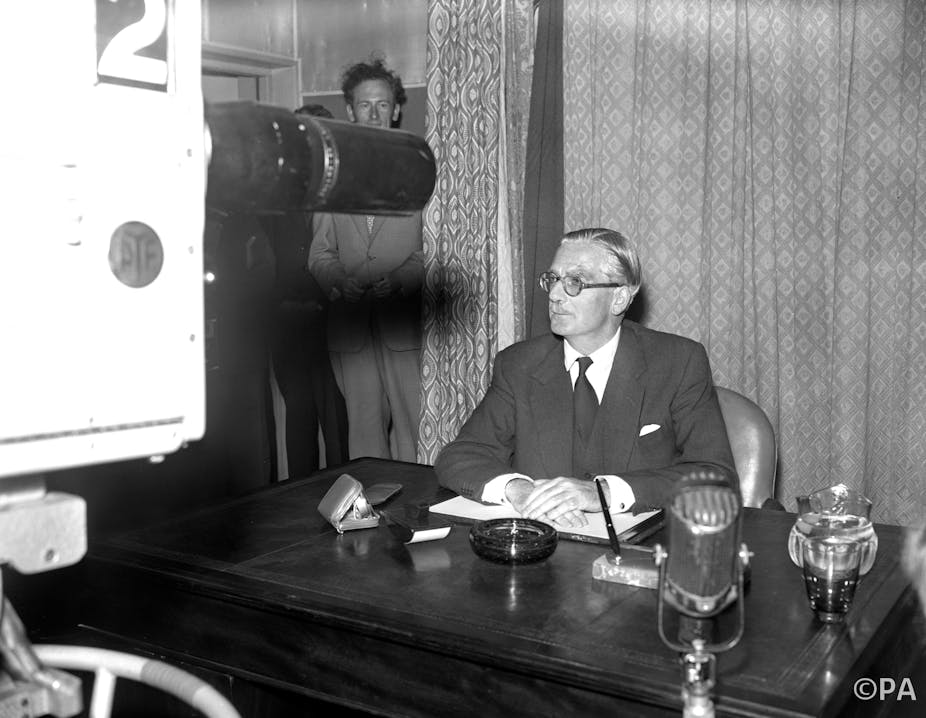As a broken David Cameron made his dramatic resignation statement outside Number 10 Downing Street on the morning after the referendum, the ghosts of Suez seemed to hover ominously in the air.
It was 60 years ago that Britain and France, acting in collusion with Israel, invaded Egypt in an attempt to seize the Suez Canal, which had been nationalised by President Gamal Abdel Nasser. When a furious Dwight David Eisenhower (“Ike”), then US president, demanded a ceasefire, and threatened to cut off Britain’s oil supplies, the Anglo-French Operation Musketeer was halted, leaving Nasser emboldened, London humiliated, prime minister Anthony Eden’s reputation and political career in ruins – and Britain isolated internationally.
In the aftermath of the EU referendum result, commentators have been quick to draw parallels with the Suez Crisis. As Jeremy Paxman put it “no prime minister has made a bigger miscalculation since Anthony Eden”, while in Gordon Brown’s judgement, the outcome of the referendum has “left us more isolated from our international partners than at any time since the humiliation of Suez”.
The similarities are striking enough. An Old Etonian prime minister, convinced that he knew best, forced to resign in disgrace, just a year or so after winning a general election. A dramatic run on the pound that threatens economic collapse. Bitter domestic divisions, and diplomatic isolation.
And, as was the case 60 years ago, the ruling class now faces something of an existential crisis. After all, almost the entire British establishment – including the leaders of all the major political parties, the unions, businesses, universities, and the cultural great and good – was united behind Cameron’s efforts to remain within a “reformed” European Union.
In a broader sense, 2016 is, like 1956, shaping up to be a year of extraordinary drama and international upheaval.
Different rulebook
When Eden tendered his resignation on January 9 1957, it was the constitutional responsibility of the Queen, under the power of the royal prerogative, to appoint a new prime minister. Unlike today, there were no formal rules governing the election of a new Conservative Party leader: no campaign launches, leadership hustings, or formal votes – and certainly no question of balloting ordinary party members.
Instead, it fell to party grandees David Maxwell Fyfe, the Lord Chancellor, and Robert Gascoyne-Cecil, the Lord President of the Council, to advise the palace on the succession. The two men canvassed the views of cabinet members (who were interviewed individually) and gauged opinion among backbenchers and constituency chairmen. Edward Heath, the chief whip, John Morrison who was chairman of the backbench 1922 committee, and Oliver Poole, the party chairman, were consulted.
While commentators appeared certain that R A Butler, the leader of the house and Eden’s de facto deputy, would prevail, opinion within the party swung overwhelmingly behind Harold Macmillan – and so it was the chancellor of the exchequer who, on the afternoon of January 10, was summoned to Buckingham Palace. During his 30-minute audience with the Queen, Macmillan famously predicted that his government was unlikely to last six weeks.
That Suez had delivered Macmillan the keys to Number 10 was ironic, given that he had done a good deal to cause the crisis in the first place. He had egged on the prime minister and argued that the military objectives should be expanded to include the destruction of Nasser’s armies and overthrow of his government.
Catastrophically, on the eve of the crisis, Macmillian also assured his cabinet colleagues that, if presented with a fait accompli, Washington would simply acquiesce. “I know Ike,” explained Macmillan – who had worked closely with Eisenhower during the Second World War – “He will lie doggo!” He couldn’t have been more wrong.
Clearing up the mess
Rejecting calls from Hugh Gaitskell, the Labour leader, to call an immediate general election, Macmillan – who was unfairly derided by his critics as a mere “showman” – worked assiduously to mend the transatlantic alliance. He made the most of his personal connections and considerable charm: although the ultimate price was, effectively, subservience to Washington.
In Whitehall, it became something of an article of faith after Suez that no significant gap could ever be allowed to open up between the UK and the US on a major question of war and peace. And, as the British Empire was dismantled in Africa and the Caribbean, Macmillan sought to re-orient British foreign policy towards Europe, leading the failed attempt to join the Common Market in 1963.
At home, Macmillan focused his efforts on restoring the confidence of the nation (as well as that of his shattered party), and governed as a one-nation Tory during a period of rising economic prosperity. A patrician figure, Macmillan sought to exude a spirit of calm authority – hanging up a sign in Downing Street that declared “Quiet, calm deliberation disentangles every knot.” In 1959, he won a landslide victory in the general election, campaigning under the slogan “Life’s Better with the Conservatives – Don’t Let Labour Ruin It.”
In 1956, those who believed that Britain was a great power, entitled to act independently to safeguard what were seen as vital national interests, learned a harsh lesson about the economic and geopolitical realities of the post-war era. In the end, those who had helped to cause the disaster proved able to save the country from ruin. It is too soon to be able to predict with any confidence whether history might be about to repeat itself.

